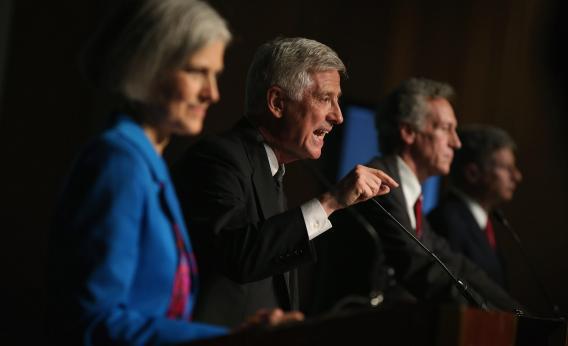It took a cast of political eccentrics with no hope of winning the election, but Tuesday night finally brought a presidential debate that addressed climate change.
After three Obama/Romney debates and one vice presidential debate without a single mention of global warming, three of the four participants in a third-party candidates debate moderated by Larry King treated it as a serious issue.
In her opening statement, Green Party candidate Jill Stein called for a “green New Deal to create 25 million jobs, end unemployment, jumpstart the green economy—and that means putting a halt to climate change and making wars for oil obsolete.” Rocky Anderson of the fledgling Justice Party went further, saying that the Pentagon had warned that “climate change is a greater long-term security risk to the United States than terrorism.”
The media’s fact-checkers apparently had the night off, so suffice it to say that it’s unlikely the Pentagon would officially endorse that precise claim today. Still, Anderson is right that the Pentagon has identified climate change as a serious threat on several occasions. Obama and Romney, in contrast, have been mum, probably because neither candidate believes he has anything to gain politically from broaching the issue. (Why the moderators have let them off the hook is harder to understand.)
The third-party debate also highlighted issues on which small-government conservatives and big-government liberals seem to agree, but which mainstream Republican and Democratic poilticians like Obama and Romney prefer to avoid. For instance, all four of the candidates indicated they would cut defense spending. That included old-school Virginia conservative Virgil Goode of the Constitution Party, who said the United States “cannot be the policeman of the world.” The candidates lamented civilian casualties from drone strikes, and Stein went so far as to call for banning them altogether.
All four also piped up for civil liberties, criticizing laws that allow for the indefinite detention of U.S. citizens without trial. Anderson calling the National Defense Authorization Act “the very definition of tyranny.” Each railed against corporate spending in campaigns, with Libertarian Gary Johnson joking that the major-party candidates should have to wear NASCAR-style jackets with stickers displaying their corporate sponsors. And three of the four—Stein, Anderson, and Johnson—said they would legalize marijuana.
The debate was broadcast only online and on C-SPAN. It didn’t make front-page headlines or launch any great Twitter memes, and it probably won’t have much impact at all on the election (although the Washington Post’s Sean Sullivan notes that Johnson and Goode could siphon a few votes from Romney in key states). And while each candidate voiced some views that would probably appeal to a lot of voters, each also took stands that many would find beyond the pale.
Still, in a campaign in which the major candidates harp endlessly on the same handful of talking points, Tuesday night served as a refreshing reminder that not every politician considers climate change, civil liberties, and the war on drugs so marginal as to be unworthy of mention.
A full replay is available here.
